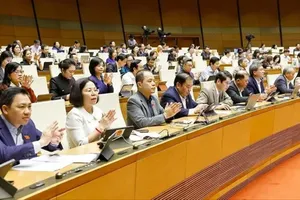
This was heard at the National Assembly’s discussion this morning following a report from its supervisory delegation. This report detailed the progress on policies and laws regarding real estate market management and social housing development from 2015 through the end of 2023.
In a report presented to the National Assembly, Chairman of the National Assembly (NA)'s Economic Committee Vu Hong Thanh said that despite notable achievements in the formulation and implementation of policies and laws regarding real estate market management and social housing development, there remain several shortcomings and limitations.
The structure of the real estate market is currently inefficient. There is a significant gap between supply and demand, with a disproportionate focus on high-end, investment-oriented properties. This leaves the majority of the population with limited options for affordable housing, despite strong demand. The real estate market is characterized by an imbalance between supply and demand, particularly for affordable housing. The majority of current supply comes from older projects, with few new developments. This, coupled with a strong demand for affordable housing, highlights the need for a shift in market focus.
Certain projects encounter legal challenges, particularly concerning the issuance of certificates for land use rights, property ownership rights, and other assets associated with land.
Many real estate businesses struggle with limited financial resources and lack the necessary implementation experience. This often results in ineffective projects and subpar real estate products.
The Chairman of the National Assembly's Economic Committee highlighted that some businesses are mobilizing capital beyond their ability to maintain a healthy cash flow. This practice, often used to acquire additional land and fund business expansion, poses potential financial risks.
Furthermore, companies employ various financial leverage instruments, which result in extended investment timelines and procedures, thereby escalating financial expenses and complicating the reduction of real estate prices to their actual worth. The corporate bond market for real estate is laden with risks. The condotel and officetel real estate sectors are nearly stagnant.
During the period from 2022 to 2023, a significant number of housing real estate projects faced various challenges, leading to delays and even halting progress altogether. The vast resources put into these projects resulted in wasted land and capital, which only compounded difficulties and increased costs, subsequently driving up product prices. As a result, many urban areas were left abandoned.
Real estate prices have increased significantly faster than the income growth of the majority of the population. This rapid price escalation has resulted in a severe shortage of affordable housing options in major cities such as Hanoi and Ho Chi Minh City. The gap between real estate prices and average income has widened dramatically. As a result, there are no longer any affordable housing segments available to the majority of people in Hanoi and Ho Chi Minh City.
The supply of social housing apartments available in the market significantly falls short of the existing demand, with many areas failing to achieve the established targets for social housing development.
On the other hand, there are regions where supply exceeds demand, leading to a surplus of unsold or unoccupied properties. This inefficient allocation of resources has a negative impact on macroeconomic development.
The current challenges faced by real estate businesses and commercial banks pose significant risks to the bond market. This situation could lead to decreased state budget revenue and an increase in bad debts. Moreover, these economic strains may result in social instability, affecting job security and housing for many individuals.

The examination of criteria and validation of eligibility for social housing policies, which include stipulations such as lacking housing, residing in a province that offers social housing, and having an income exempt from personal income tax, continues to involve numerous complex and burdensome processes.
Some regulations lack clarity and specificity, making it difficult to interpret and implement them effectively. Additionally, coordination between local departments, agencies, and sectors is often inadequate, further hindering the implementation process and extending project timelines.
The monitoring team identified several reasons behind the existing limitations. Notably, the organization of law enforcement remains a weak link, marked by low efficiency. Many localities are hesitant to take risks due to fear of making mistakes and a short-term mindset, which contributes to a lack of close guidance in project implementation and delays in addressing necessary procedures.
There is a notable lack of focus on the development of social housing and accommodations for workers and laborers within industrial parks, as well as insufficient planning and land allocation for independent social housing initiatives.
The monitoring delegation found that the primary obstacles to the effective promulgation and implementation of policies and laws on real estate management and social housing development can be attributed to the actions and inactions of central and local government agencies, as well as real estate investors and businesses.
The Chairman of the National Assembly's Economic Committee highlighted that the monitoring delegation put forth critical and long-term strategies aimed at restoring real estate prices to their true values. They urged the necessity to curb speculative practices and the misuse of land use rights auctions that fuel price surges. Furthermore, they emphasized that any issues falling within a specific authority should be addressed at that level and criticized the tendency of ministries and agencies to provide vague guidance and responses lacking in clarity.
The committee also advised to address issues related to avoidance, evasion, and reluctance to assume responsibility in the execution of tasks within agencies and units. It is essential to prevent delays and ensure that work is completed in a timely manner. This includes reinforcing discipline, enhancing the accountability of leadership, and intensifying inspections and audits. Furthermore, it is imperative to take decisive and stringent action against corruption, negative behaviors, conflicts of interest, and local biases in the implementation of laws governing real estate management and the development of social housing.
By the end of the monitoring period, a significant number of real estate development projects were underway. Specifically, there were approximately 3,363 commercial housing and urban area development projects, utilizing a land area of approximately 11,191 hectares. Additionally, 413 industrial parks had been established, occupying a total industrial land area of approximately 87,700 hectares.
Meanwhile, approximately 800 projects have been executed supplying a total of 567,042 apartments. Specifically, 373 projects have reached completion, accounting for 193,920 units; 129 projects are currently under construction, representing 114,934 units; and 298 projects have received investment approval, totaling 258,188 condos.
























